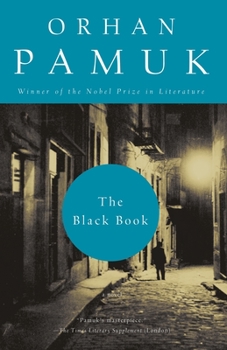The Black Book
Select Format
Select Condition 
Book Overview
From the Nobel Prize winner and acclaimed author of My Name is Red--a brilliantly unconventional mystery of a missing wife, and a provocative meditation on identity.
"A glorious flight of dark, fantastic invention." --The Washington Post
Galip is a lawyer living in Istanbul. His wife, the detective novel-loving Ruya, has disappeared. Could she have left him for her ex-husband or Cel?l, a popular newspaper...
Format:Paperback
Language:English
ISBN:1400078652
ISBN13:9781400078653
Release Date:July 2006
Publisher:Knopf Doubleday Publishing Group
Length:480 Pages
Weight:0.81 lbs.
Dimensions:1.1" x 5.3" x 8.1"
Customer Reviews
4 ratings
Labyrinthian inquiry into the Turkish identity
Published by Thriftbooks.com User , 16 years ago
This is a fascinating novel. To be sure, if you have read other books by Pamuk, you will recognize the themes: the void that Attaturk's reforms could not fill (after the collapse of the Ottoman Empire); the continuing crisis of the Turkish identity that plays out in politics; and the extraordinary richness, humor and melancholy of the current culture. These are wonderfully sketched out in Pamuk's memoires, Istanbul, but also in the switching identities and interminable conflicts in his other novels. What makes this book interesting for hard fans like me is that it is his first, hence the source, of these later masterpieces of genius. It is serious, complex literature, that the reader can plumb for years in the imagination. First, there is the plot and setting. A beloved wife has disappeared, and her seemingly hapless husband embarks on a search for her, grief stricken to the point that his sanity is shaken. This offers a wonderful portrait of the unknown, banal corners of Istanbul, just prior to the coup d'etat in the early 80s. Chaos is mounting, amidst the usual joyous cacophony of people and everyday struggle. It is warm, funny, and moving. Second, there is the culture and identity. Turks are uncertain if they belong to the East or the West, which they mimic in Pamuk's eyes to an absurd extent. To fill this void, they turn to writers, such as the lawyer's mysterious cousin, a famous columnist. In my reading, his loyal readers are searching for themselves through his eloquence and culture, as he retells old tales as well as finds new ones, which he expresses through his own brand of mimicry (or transmogrification). The Lawyer studies him as the key to the secret of his wife's disappearance, eventually taking on much of his identity. Third, there are the interactions, both with history and similar people in the present. It all mixes in a kind of Nabokovian dream, where there are real and imagined threats and relationships. The mind of the lawyer, seemingly so mundane, is revealed here with great depth, layers that peel away repeatedly. My interpretation of the book is that it is about the internal narrative of our lives - the stories we tell ourselves about who we are - that is the basis of personal identity and even cultures. In ascendant, self-obsessed countries like the US, this narrative goes largely unexamined in our presumption that everyone should want to live like us. This novel offers a strikingly different vision of this narrative, one that is wounded by history and in search of words and concepts to re-make itself. I think this is a great human dilemma, from which Americans can learn to better see themselves as well as empathize with other peoples, particularly in the current crisis of the Moslem world. The translation is very vivid, though of course I cannot read it in the original. There is also a fascinating translator's note, in which she discusses the complexities of Turkish. It makes me wish I had lea
wonderfull
Published by Thriftbooks.com User , 20 years ago
I have recently finished Orhan Pamuk's Black book, and I have read itin original. This is the fourth Pamuk book I have read (I liked his other works too), and I undestand (and I also agree) why they refer this book as "Pamuk's masterpiece". The book gives glimpses of Itanbul's life in 60-70's, it blends modernizm with sufi thinking, and it has references to comtemporary political discussions in turkey, struggle of turkish identity between east and west, etc. The book has so many details, which makes it sometimes a difficult, but definetely an enjoyable read. Especially Chapter 2, "the day bosphourus's dries up", is my favorite part, which I have read numerous times, and everytime I read it, I noticed a new detail. Sure, this book is not a thriller, and some people can, and will find it boring. However, as one master once said "this book is like wine, and everybody drinks water". I strongly suggest it, if you like literature you will enjoy it. It is among my favorites now.
A rare success.Original and mystic
Published by Thriftbooks.com User , 24 years ago
I had heard about this book long time ago and now I understand why it is a myth in Turkish Literature.I have not read another book that has so much ideas,colours of life and enigmas.From first pages it takes you to a gloomy and majestic world.Once again Pamuk brings you Istanbul,East and its unique philosophy
One Word: Intelligent!
Published by Thriftbooks.com User , 24 years ago
If you ever thought of grasping the late 20th century Turkish psyche, you just couldn't have a better guide than Orhan PAMUK. The intellectual package he uses in his criticism of Turkey and comparative historical information bits he inserts here and there (which are actually very intelligent, and admittedly at times wishful, criticisms of the West) will help you start to understand this ever-transitioning, confused people of Eurasia. Unfortunately, his intellectual depth may sometimes be a hindrance for the impatient reader.If you liked this book, go ahead and buy his other books, esp. The New Life and the upcoming translation of My Name is Red. You won't be wronged!






